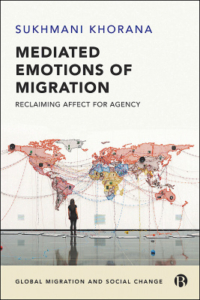The novel Best of Friends by Pakistani-British author Kamila Shamsie focuses on two powerful women in contemporary London. In a sub-plot, the Civil Liberties Centre Director has a bag of human faeces thrown at her office window. While she is a migrant woman who fights for racial and economic justice and rails against the Conservative government, her childhood best friend (also a woman from Pakistan) prefers company profit over principle.
Two brown women in real life who are also in the London elite thanks to their class and educational capital are Home Secretary Suella Braverman and her predecessor, Priti Patel, both of South Asian descent. Yet there seems not to be the same ideological divide between these women as there is in Shamsie’s novel, with the vitriol they have both displayed against asylum seekers trying to enter the UK defying the logic of their own migrant trajectory.
In the case of Braverman, her comments referring to those trying to enter the south coast of England as an ‘invasion’ came just after a petrol bomb was aimed at a migrant centre in Dover, making the faeces bomb of Shamsie’s fiction pale in comparison.
Why do Braverman’s comments matter? How and why has the discourse of migration, and refugees in particular, reached such inhumane lows? Most importantly, can we recover?
First, attitudes to migration and asylum seekers and refugees in particular are ‘rationalised’ as merely responses to circumstances rather than a reflection of fear and hate in the broader population (including in other racialised minorities). It benefits the system to argue that this is the proper response to an excess, an ‘invasion’ or a flouting of national sovereignty. Yet emotions are in fact key to understanding why we have certain immigration policies and who they really benefit.
The idea of feelings that stick to bodies can be applied in my view to the negative affects attributed to migrants. These affects shift over time for different kinds of migrants, and are used to sentimentalise public discourse and justify a global rise in xenophobia and populism.
The reason the discursive constructions of migrants is important is because they may or may not be based on real interactions with them. Such mediated stories often inform perception and policy, and impact the affective environment in which migrants find themselves, as well as the extent to which their own agency is recognised.
Most politicians and political parties (on both sides of the spectrum, as has been the case in Australia for over two decades) recognise that they can get mainstream support for migration by pitting the ‘good skilled migrant’ who contributes to the economy against the ‘bad refugee’ who is depicted as a drain on resources at a time of economic crisis. This is in turn conjured up as a rational characterisation of both categories rather than revealed for what it really is – an age-old stereotype of colonised peoples serving a domestic political agenda.
Ambivalent emotions like empathy, aspiration and belonging still have transformative potential, particularly with regards to making space for migrants and refugees to claim agency. Yet migrants’ own emotions and decision-making capacity are overlooked, thereby making them objects rather than subjects of politics.
The way forward requires an intervention by all mainstream media outlets, including those that are ideologically left-wing, to do better in showing refugees as thinking, feeling subjects with agency. Even in the stories condemning the speeches and actions of Braverman and Patel, there is barely a mention of who is fleeing, from what, and how they feel about this commentary. Independent media collectives such as Media Diversified have re-emerged in the wake of the recent inhumane policy responses of the Conservative government, including the Nationality and Borders Act 2022. They recommend more representation from marginalised communities in the media workforce so that issues of racial justice are not just reported on, but also centre BAME voices.
One way of re-emphasising care and solidarity is by citing instances where embodied and civic care practices are undertaken by migrants and refugees, such as during COVID-19 lockdowns across the Global North. Echoing the solidarities of the public health crisis, the Black Lives Matter protests also called forth support and allyship from other racialised communities, such as Asian Americans and Muslim Americans. What these emerging models of mediated solidarity underscore is an ethics of care that is conscious of the language of justice and human rights, but is also equally attuned to the need for mobilisation of communities through transformative emotions. With regards to resisting the UK government’s pseudo-rational portrayal of asylum seekers and refugees, diverse community groups and NGOs are already coming together and creating campaigns on grounds of legality and humanity.
Sukhmani Khorana is Associate Professor in Media at the University of New South Wales.
 Mediated Emotions of Migration by Sukhmani Khorana is available on the Bristol University Press website. Order here (EPUB at £27.99, hardback at £80.00).
Mediated Emotions of Migration by Sukhmani Khorana is available on the Bristol University Press website. Order here (EPUB at £27.99, hardback at £80.00).
Bristol University Press/Policy Press newsletter subscribers receive a 25% discount – sign up here.
Follow Transforming Society so we can let you know when new articles publish.
The views and opinions expressed on this blog site are solely those of the original blog post authors and other contributors. These views and opinions do not necessarily represent those of the Policy Press and/or any/all contributors to this site.
Image credit: Phil Botha on Unsplash


